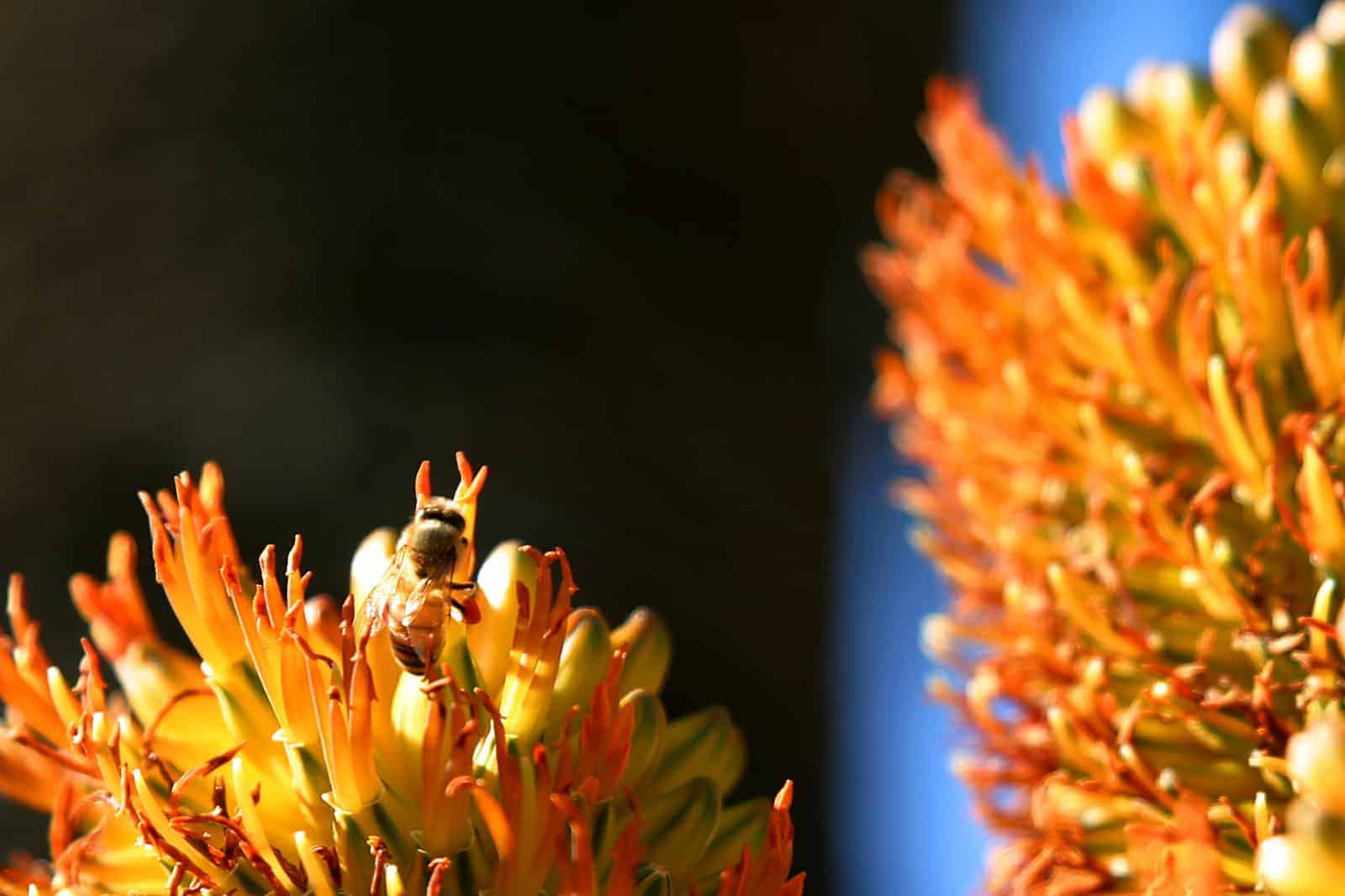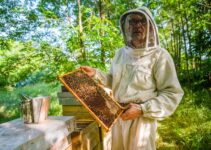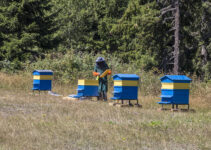On a spring day, it’s not uncommon to see swarms of bees flying between flowers, getting the pollen that they need. But as the sun goes down, this sight isn’t as common. Is this just your imagination, or do bees have problems seeing at night?
Most bee species won’t fly at night. They will lie dormant in the hive, conserving their energy. However, some can move around, navigating based on their memory.
How bees approach the night can vary from species to species. It can also depend on the amount of light available. Keep reading to learn more about how bees act at night.
Can Bees See in the Dark?
The first thing we need to understand is whether or not bees can see in the dark. This will depend on the type of bee. They can be split into three categories, which are:
- Diurnal. They will be active during the day. When the light gets too dim, they will return to the safety of the hive.
- Crepuscular. In this case, the bees will need brighter skies that are present during dawn and dusk. They will only come out during these times. As a result, they will spend most of their time in the hive.
- Nocturnal. The bee species in this category will only come out under the cover of darkness.
The clear majority of bee species will be diurnal. However, there is a handful that are crepuscular and nocturnal. These are often found in tropical parts of the world.
One of the best ways to see whether the bee is nocturnal or crepuscular is by looking at their eyes. The bees who are nocturnal will need to be able to get more light, allowing them to navigate properly. As a result, their eyes will be substantially larger than the average diurnal bee species. In some cases, they can be half a millimeter larger.
There are a few reasons why some bee species are nocturnal or crepuscular while most are not. This can include:
- Protection from predation. Most predators will expect bees to be active during the day. If they head out at night, they won’t attract the attention of these predators.
- Less competition. During the day, there will be more pollinators to content with. This can be a problem, forcing them to fight to try and get nectar. At night, this pressure will be greatly reduced.
- Lack of water. When flying during the day, it will cause them to lose water faster. This can be a problem in drier regions.
- Flowering at night. Some types of flowers will only open at night. If bees aren’t flying at night, they won’t be able to gather nectar from these flowers. This is most common in tropical environments.
- A combination. The most likely explanation, though, is a combination of two or more of these elements.
Do They Fly Around at Night?
Whether a bee will fly at night will often depend on the type of species they are. It can also depend on the amount of light available. Sometimes, there will be enough light under a full moon for them to find their way around. In these conditions, normally diurnal bees might still be flying around.
On a typical night, though, most species of bees will be at the hive. They will start to return to the hive shortly after the sunset. By this point, the light will be too dim to allow them to continue to navigate.
Interestingly, scientists studied nocturnal bees to see if they had evolved the ability to see in the dark. To do this they moved objects around. When they did this, they found that the bees were unable to fly back to their nests. This suggests that they were navigating based on their memory, rather than through their eyesight.
What Bees do at Night
When they return to the hive, they will often go dormant. This allows them to conserve their energy. Their body will relax. The more deeply asleep they become, the more relaxed their bodies will be.
The only type of bee that doesn’t follow this pattern is the queen. When she is laying her eggs, she will work through the day and night. When she is not laying, she will also go dormant.
Will Bees Attack at Night?
Even though most bee species will be dormant at night. As a result, they will be less likely to attack. But they will still sting you if they have been provoked. There are a few reasons why this might attack a human. These can include:
- Poor weather. This can make bees more defensive. This is especially common during the beginning of winter when they are trying to protect their supply of honey.
- Shortage of pollen or nectar. If bees have started to starve, they will naturally become more aggressive. They will fight to protect the resources that they have been able to acquire.
- Death of the queen. This is one of the most traumatic events in the hive. Without a queen, there won’t be anyone to lead the group. The good news is that this is fairly short-lived as the worker bees will instantly start making a replacement.
- Attacking the hive. The most reason why you will be stung at night is that you are attacking the hive. If they feel that you are a threat to the hive, they will attack you, even in the dark.
Bearding at Night
Most of the time bees will be dormant at night. But there is one instance where they will still be moving around the hive. This is known as bearding, because of the pattern the bees are in, making it look like the hive has developed a beard. Often, the bees won’t be flying in this formation. They will simply be clinging onto the edge of the hive.
The reason why this behavior is occurring is very simple. The hive is too hot. If the bees stay inside the hive, there is a chance that they will overheat and die. As a result, they will move to the outside. By clinging to the hive, they’ll be able to feel the internal temperature. When it is safe, they will fly back inside the hive again.
This is a normal response and will often occur during the summer months. It can be a sign of a healthy hive since it means that there are a lot of bees. They will naturally adjust the ventilation, to cool the hive.
Are the Bees Attracted to Light?
During the day, bees have a positive phototaxis response. This means that they are attracted to light. This is more common in forager bees, who are the most experienced at leaving the nest. However, this is unlikely to happen at night. As we mentioned, the bees will go dormant throughout the evening. Adding a light source isn’t going to change this behavior. Though a few foragers might come out to investigate, most of the hive will stay dormant.
Sometimes, you might find a bee flying toward the light at night. This could indicate that they have developed a parasite in the brain. This can make them fly towards the light or become disorientated. They will die shortly after this.
Final Thoughts
Like humans, bees will need to sleep. Most species will do this during the night. As they won’t be able to see where they are going, it doesn’t make any sense to try and get nectar. However, this isn’t the case universally. Some bee species have been known to fly during dusk and dawn. Others have been known to fly at night. Generally, though, you are unlikely to get stung by a bee during the night unless you are attacking their hive.




